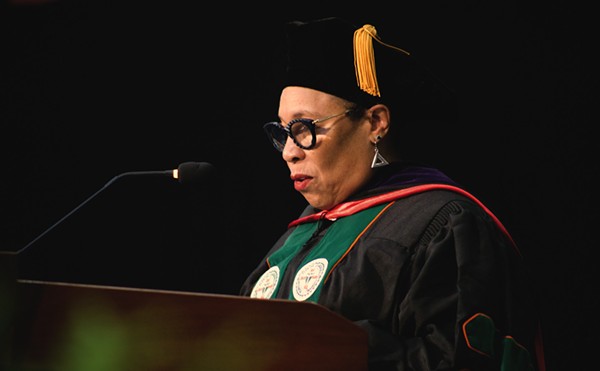
A controversial bill in the Ohio Statehouse would force educators to out students to their parents and require public schools to give parental notification before teaching “sexuality content.”
House Bill 8 was introduced by State Reps. D.J. Swearingen, R-Huron, and Sara Carruthers, R-Hamilton, in February and opponents are saying it’s another anti-LGBTQ bill.
Amendments recently made to HB 8 changed the bill’s original language from “sexually explicit content” to “sexuality content” which is defined as “oral or written instruction, presentation, image, or description of sexual concepts or gender ideology.”
The bill, also known as Enact the Parents’ Bill of Rights, would require public schools to notify parents about sexuality content materials, give parents a chance to review them, and give parents the option to request alternative instruction.
“What the most recent amendment did was specifically identify that school districts need to essentially give families an opt-out from sexuality content,” said Cynthia Peoples, director of Honesty for Ohio Education. “It also specifically identified that districts must out any student that identifies as transgender, gender diverse or non-binary, which we know can cause so much harm and danger to the child.”
HB 8 started off as a fairly neutral education bill that has since morphed into anti-LGBTQ legislation through these amendments, said Kathryn Poe, spokesperson for Equality Ohio.
“What the committee has done, which has been really disappointing to watch, is they have basically made this a ‘Don’t Say Gay’ bill targeted very explicitly at the LBGTQ community,” Poe said. “What this bill really does is label LGBTQ topics as something that is perhaps inappropriate for the classroom.”
Sexuality content
Mallory Golski, the civic engagement and advocacy manager at Kaleidoscope Youth Center, is critical of the latest amendment to the bill and worries about the potential chilling effect this could have in schools.
“By calling it sexuality content it is clear that it is targeting LGBTQIA+ youth and even something as simple as a story that they might be reading in English class, if there is a queer character in that story, that can be flagged as sexuality content,” Golski said. “If the same plot was happening with a straight couple, it might not be flagged as sexuality content.”
State Rep. Joe Miller, D-Amherst, said HB 8 is turning into anti-LGBTQ legislation.
“The way this definition reads to me … is this amendment is intended to be an anti-gay, anti-trans bill that’s targeting these most vulnerable children,” Miller said during the House’s June 6 Primary and Secondary Education Committee meeting.
Committee chair State Rep. Adam Bird, R-New Richmond, responded by saying he talked to the bill’s sponsors and said it’s not trying to prohibit that kind of instruction.
“There are students in Ohio that are being taught those kinds of things without parent knowledge and we want to give those parents the right to opt their child out of those kinds of lessons,” said Bird, a former school district superintendent.
The bill’s amendment specifies that sexuality content does not mean venereal disease, child sexual abuse prevention, and sexual violence prevention education.
“Outing of students when they don’t fit the mold”
Another part of the most recent amendment would require educators to notify parents about “any request by a student to identify as a gender that does not align with the student’s biological sex.”
The term “biological sex” as it relates to gender identity is rejected by the LGBTQ+ community as politicized and inaccurate, with the term “gender assigned at birth” being the preferred construction.
“I’m worried that this amendment is not so much about the content of what the teachers are educating the students on, but more so an outing of students when they don’t fit the mold,” said State Rep. Jessica E. Miranda, D-Forest Park. “I don’t want us to get further and further and closer and closer to the infamous legislation in the state of Florida’s so called ‘Don’t say gay’ bill.”
Florida’s “Don’t Say Gay Bill” took effect last summer and prohibits classroom discussion about gender identity and sexual orientation in certain grades.
“This is dangerous for education here in Ohio and this is dangerous for our educators to be held to this kind of standard and more importantly, it is dangerous to our students who are just trying to go to school, be educated and live their lives,” Miranda said.
Nearly 1 in 5 transgender and nonbinary young people attempted suicide in the past year, according to the Trevor Project’s 2023 survey of mental health of LGBTQ youth.
“Everyone is entitled to their own privacy,” Golski said. “… It would violate that privacy by requiring teachers and other adults in schools to out students to their families or disclose other things that they shared in confidence.”
Poe, who uses they/them pronouns, said this policy could lead to severe consequences for LGBTQ youth.
“If you are a queer child now in Ohio’s schools, this law could effectively ban you from talking about your own identity … to any discussion of LGBTQ topics ever being mentioned at all,” they said.
Proponents of HB 8
The bill’s sponsors argue the bill is about parental oversight.
“The school district is prohibited from keeping changes in the health of the student from their parent, and the school district is also prohibited from encouraging the student to hide these issues from their parents,” Swearingen said during sponsor testimony in March.
Swearingen and Carruthers introduced similar legislation last General Assembly with “sexually explicit” language, but it didn’t get out of committee.
“Parents need to have a seat at the table when it comes to their children,” Carruthers said during sponsor testimony.
Lisa Breedlove Chaffee, director of Parents Rights In Education for Ohio, is in favor of the bill.
“I support it because I support the rights of parents to know what is happening to our children,” she said. “It will make it illegal to withhold information from parents.”
She argues the bill is not anti anybody.
“Children are very vulnerable …kids need the love and support of their parents,” Chaffee said. “It is about protecting the rights of parents and of students.”
The Parents Rights In Education for Ohio was identified as an anti-government extremist group in 2022, according to the Southern Poverty Law Center’s latest report.
Originally published by the Ohio Capital Journal. Republished here with permission.










